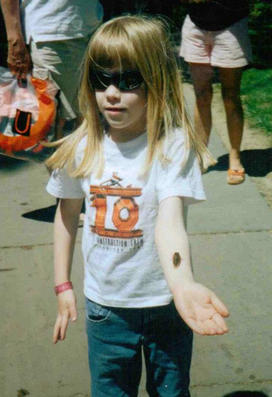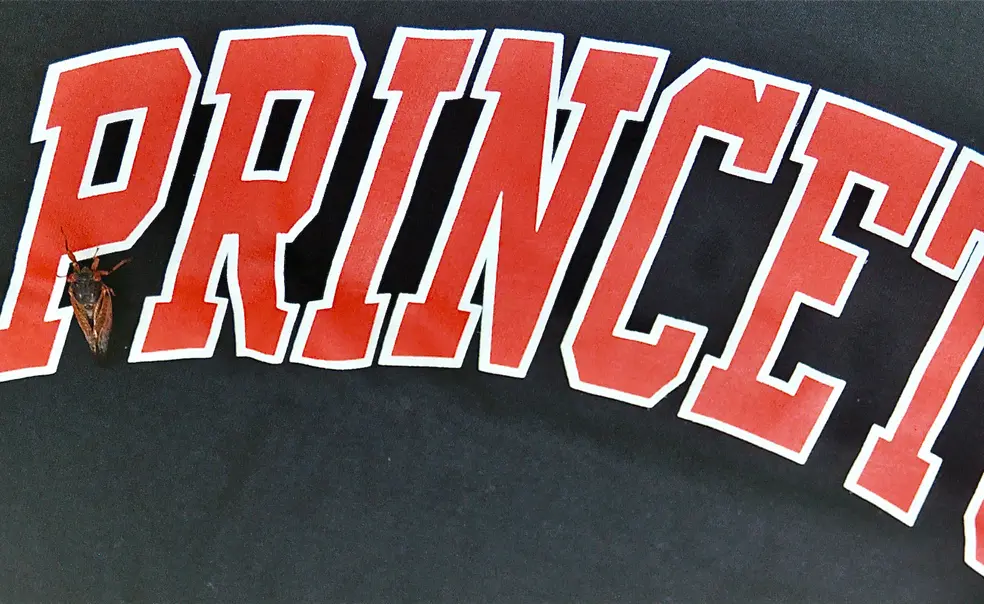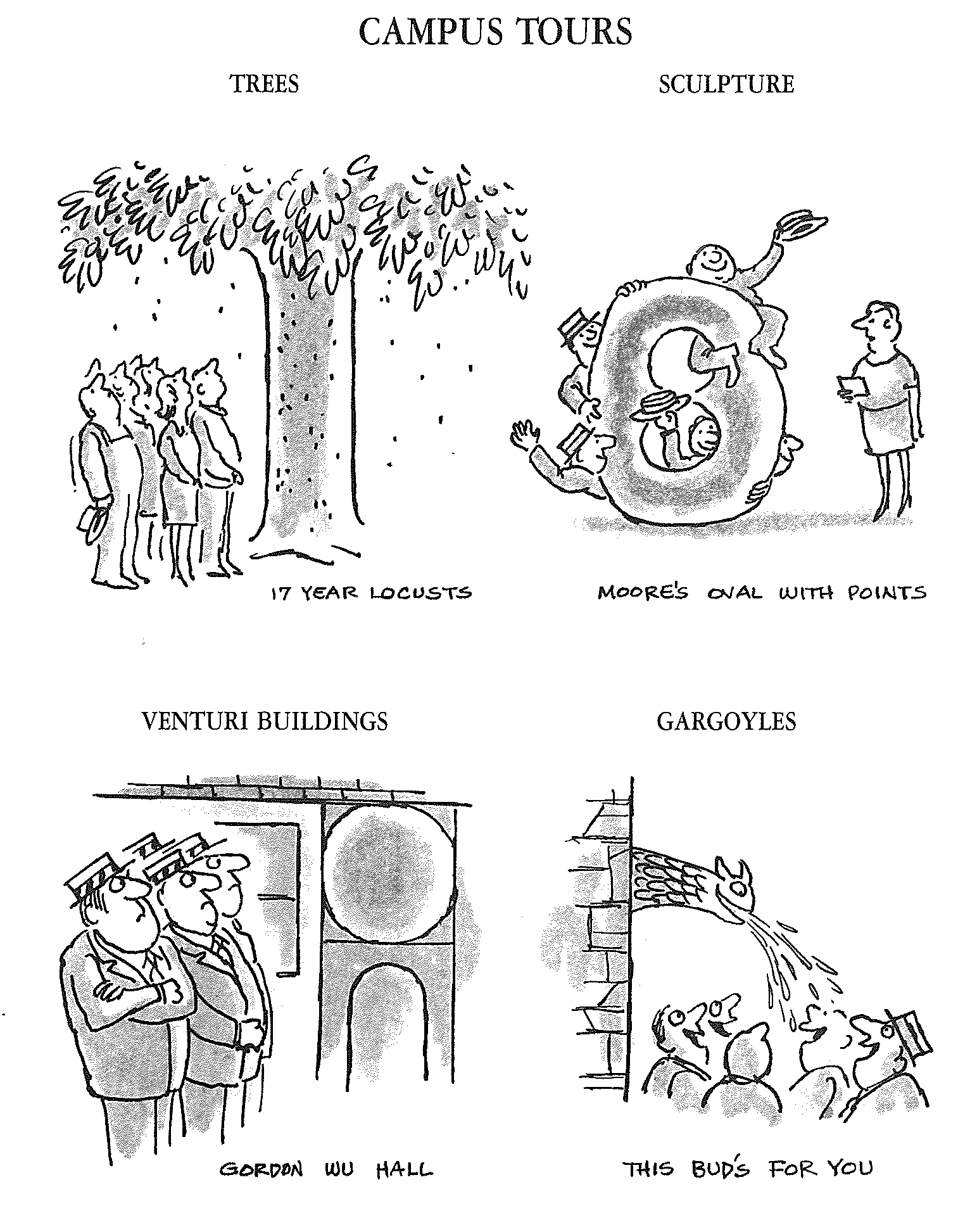Adrian “Woody” Woodhouse ’59 remembers the periodical cicadas. How could he forget? At his class’s 45th Reunion in 2004, he writes, the trees along Alexander Road were “just swarming in the critters.”
“Trying to keep food protected was a full-time project,” Woodhouse wrote in an email to PAW. “My wife’s memory was the constant crunching noise and feel of treading on them!”
The Brood X cicadas crawl out of the ground every 17 years and fill the ears of Princetonians with their shrill mating calls. Harmless and supposedly tasty, they’re known as one of nature’s most interesting events, and, with their orange-and-black wings, one of Princeton’s stranger traditions.
Often they’ve arrived just in time for Commencement, like in 1970, when Bob Dylan received an honorary degree and thought they were singing for him. Sometimes they’ve flown in the P-rade, and might have again in 2021 if not for the pandemic switch to virtual.
“While it is a shame this year’s Reunions are cancelled, it is probably a good one to miss,” Woodhouse wrote.
PAW went deep into the archives for memories of past cicada emergences and collected stories from alumni who remember them all too well. Have a story or photo to share? Send it to paw@princeton.edu and we’ll include it here.
From Laura K.O. Smith ’05:
I remember when I was four and the cicadas came out. I have a clear memory of sitting on a tire swing in preschool having been forced to go outside to play. I have a clear memory of them in the street. And I clearly remember telling myself I WOULD NOT be around for the next round in 17 years. I vehemently disliked the swarming, flying insects around me.
Flash forward 17 years. The cicadas came out in my junior spring. Despite my vow freshman year that I didn’t want to study abroad as I didn’t want to miss a single semester of Princeton, I studied abroad my junior spring in New Zealand. I remember being quite pleased when hearing stories about the cicadas and being perfectly happy thousands of miles away.
And now, 34 and 17 years later... I am happily far away from my 4-year-old memories of that tire swing. I am in my home in Ushuaia, Argentina, the “end of the world” where fall is settling in.

My daughter Sarah is pictured at age 6 getting to know a Brood X cicada at the 2004 P-Rade (in a T-shirt from 1992’s 10th). Now 23, she lives in Philadelphia and is following this year’s emergence via an app, so she can drive to campus for an entomological reunion at short notice. Sarah is a musical theater composer by trade and I keep suggesting she write a show entitled “Cicadas!” to no avail.
From Ray Baechler *71:
I was a graduate student (chemistry) at Princeton in 1970, when I was astounded by the massive emergence of the Brood X cicadas. I decided to return to Princeton every 17 years to welcome each new generation. I have been living near Albany, New York, since 1974, but my wife Carol and I returned to Princeton in 1987 (with our children) and in 2004.
Last week, we visited Princeton again to greet the great grandchildren cicadas of the ones we saw in 1970. We enjoyed our usual stop at Marquand Park, still harboring beautiful old trees, including the fragile Japanese threadleaf maple, which is still soldiering on. We also enjoyed lunch again at PJ's Pancake House, about the only establishment on Nassau Street (other than the movie theater) that we can recognize from the 1960s. In addition, we stopped at the Lawrence Apartments and marveled how the new high rise building looks so similar to the building we moved into in 1967, when it was brand new.
If we're blessed enough to make it possible, I look forward to another visit with the Princeton cicadas in 2038.
From The Princeton Alumni Weekly, June 10, 1987: “Henry Martin ’48 Looks at Reunions”:
From The Daily Princetonian on May 27, 1936:
The town has been visited twice by these pests in the 20th century, once in 1902 and again in 1919. The first of these visitations, according to a professor of the Biology Department who desires to remain anonymous, was the heavier. This Faculty member, then a boy of the town, took pleasure in hunting down the locusts with his air rifle, and it was no uncommon occurrence when he was able to bring down three with one shot.
From The Princeton Herald on May 23, 1953:
However, since they have been underground for seventeen years, they are entitled probably to do almost anything they want to do — although there are some people who think that they, too, would have been happy to miss the last seventeen years. These people say that, in perspective and by comparison, 1936 was a good year for nearly everyone but Alf Landon and Herbert O. Crisler, and that if they had been underground since then they would just go on staying there and dreaming about 1936 and not come up at all.
The cicada, however, is a Horatio Alger at heart and is concerned about moving onward and upward at the propitious moment, irrespective of Communism or the excess profits tax. As a matter of fact probably a lot of them are already looking ahead to 1970 — which is more than can be said for most people who are going to have about all they can stand of cicadas in 1953.
From The Princeton Alumni Weekly, July 15, 1987:
The cicadas, fittingly colored orange and black, were back for their 17-year reunion. The insects’ “high-winding trill” — as commemorated by Bob Dylan H’70 at their last appearance — seemed omnipresent, though varying in intensity from one part of the campus to another. Yet after a while it blended into the background and was scarcely perceived.
From The Daily Princetonian, May 4, 2005:
What’s a person in this one-tiger town to do if she’s looking for a gastronomic adventure? … I suggest we start serving insects. Think about it. Remember all those cicadas from last year? Well, if people would open up their minds — and stomachs — instead of viewing the swathes of cicadas as some biblical-proportion plague, one would instead see a smorgasbord of asparagus on wings (yes, they taste like asparagus). And what a delicacy they are — they only come around once every 17 years!
Want more cicadas? Check out “A Cicada Reunion” in PAW’s June 2021 issue.













No responses yet